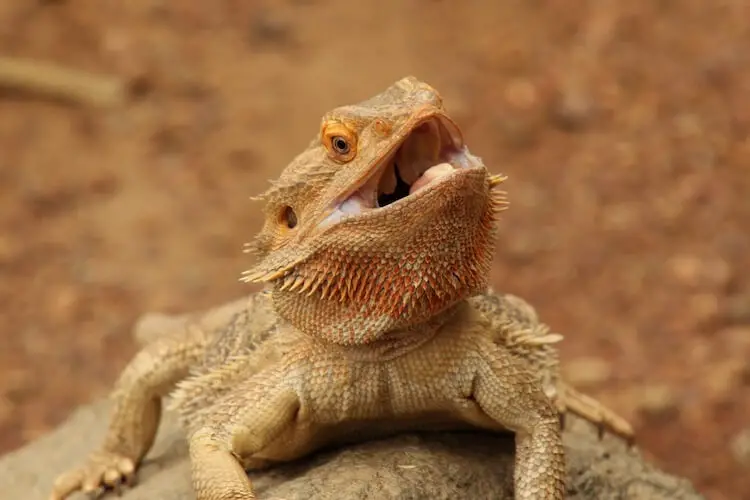
Bearded dragons are omnivores and eat a variety of vegetables, fruits and insects.
They are usually enthusiastic eaters and have a strong desire for food. A bearded dragon not eating can be cause for concern and a symptom of a wider health issue.
Like all pets, they can develop health problems from an improper diet or poor care and husbandry. The most common symptom of an unhealthy beardie is a lack of appetite.
Is your dragon going on a hunger strike?
Keep reading for a guide to the top 10 reasons why bearded dragons stop eating. We will also share 10 tips to get their appetite back…
Why Is My Bearded Dragon Not Eating?
A Bearded Dragon refusing to eat can be a sign of a health problem, the result of a poor diet, a natural behavior or bad husbandry. The following list contains the ten most common reasons for why a beardie is refusing their food:
- Brumation
- Shedding
- UVB Lighting
- Cold Tank Temperature
- Impaction
- Parasites
- Stress
- Wrong Diet
- Vitamin Deficiency
- Injury
Brumation and shedding are normal behaviors that can be concerning for new owners. They happen naturally for the duration of a dragon’s life.
Lighting, temperature, and diet can all be corrected at home, but ideally they should be set up properly before bringing your lizard home. The remaining issues may require a vet.
If an adult stops eating for more than a week, to make sure it is in good health, you should take it to a vet regardless of the reason. Juveniles should go to the vet after three days of not eating.
For each of the reasons above we will now explain signs to look out for, why this is happening and most importantly, how to get them to start eating healthily again.
1. Brumation
In the winter bearded dragons go through a period of dormancy to help save energy, this is called brumation. Brumation starts in the winter as temperatures start to cool and daylight shortens.
Brumation helps wild species save energy and increases their chances of survival and successful breeding. Many keepers who breed morphs encourage brumation in pet species for this reason.
Many pet bearded dragons do not brumate because the temperature and lighting in their enclosures remain the same year round. But, those species with a view of a window may brumate regardless of consistent temperatures. Keepers should always make sure the enclosure is not in direct sunlight.
During brumation, bearded dragons lose their appetites and dig themselves in to the substrate. They can sleep for three or four months!
Brumation is natural behavior. If your beardie starts to brumate you should not try to stop it. Instead you should:
- Lower the cage’s temperature to 72 to 75°F.
- Maintain a hot basking spot.
- Reduce all lighting to 8 to 10 hours per day.
Brumating dragons slow down their metabolism. They can go for three months without a full meal, but they will still drink. Many will snack on occasion to maintain an energy store. Make sure you offer food once a week to a brumating dragon and keep a constant supply of water in the enclosure.
As the lighting outside begins to become brighter in the spring, he should become active again and you can return to normal tank conditions and feeding schedules. After brumation, his appetite will return quickly and he should begin to eat again after five to seven days.
Overall, if your dragon starts to slow down in the early winter, he may be getting ready to brumate. Your bearded dragon will eat very little during this process and this is not cause for concern unless he starts losing significant weight.
2. Shedding
As bearded dragons grow they shed their outer layer of skin in a process called ecdysis. During this process their skin becomes white and papery, and is rubbed off in patches.
Depending on the age of the bearded dragon, the frequency and length of shedding varies widely.
A large adult may take two weeks to fully shed. A juvenile may finish shedding in a day or two. Younger dragons can shed every month and sometimes every two weeks as they go through their most rapid growth. Older adults may shed only twice a year.
If you notice your bearded dragon is not eating as much as normal, check to see if he is about to shed. If you notice white papery skin, this is the likely cause.
Before and during shedding beardies may eat less or not at all. They should be eating normally within a week after shedding. He will start to eat again after most of his skin has been shed.
Some individuals, especially hatchlings and juveniles, do not lose their appetite and will continue to eat.
Shedding happens throughout their entire life. The pattern of a reduced appetite with shedding becomes routine for long-time owners. For first time keepers it can cause concern and take some getting used to.
Brief fasting during shedding should not impact their weight, though they may become slightly lethargic and irritable. Give them time and do not try and handle them, unless you are helping with stuck shed.
3. UVB Lighting
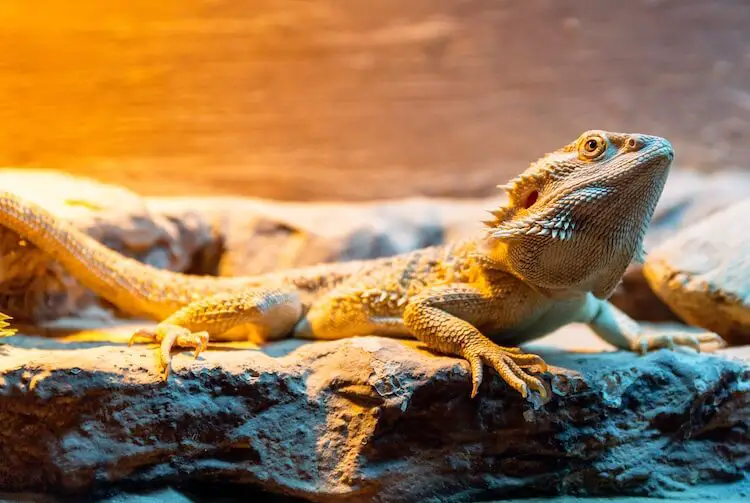
Wild bearded dragons are most active during the day and get plenty of sunlight. Pet species get “sunlight” from special UVB lighting in their enclosure. This lighting helps bearded dragons synthesize vitamin D and build strong bones.
A 10.0 UVB bulb is needed for bearded dragons and should be replaced every six months as the UVB output decreases. Beardies can develop metabolic bone disease without this.
Metabolic bone disease is a serious health problem that can deform their limbs, spines and skulls. The absence of UVB lighting normally does not result in them refusing to eat or a loss of appetite. However, the symptoms and stress of metabolic bone disease can make it hard for your bearded dragon to eat.
If your bearded dragon stops eating and does not have a UVB light, take him to a vet for blood tests. Blood tests can show if your lizard’s blood calcium is too low. This may indicate he is in the early stages of metabolic bone disease.
Metabolic bone disease can be treated, and even reversed, if caught early. A combination of adding a 10.0 UVB bulb to their enclosure and calcium injections will be part of their treatment.
4. Cold Tank Temperature
Bearded dragons are native to the scrublands of Australia and are considered a type of desert lizard. If your bearded dragon consistently won’t eat, one of the first things you should check is enclosure temperature.
Dragons that are consistently exposed to temperatures that are too low can have trouble digesting food. They may also develop a weakened immune system.
Bearded dragons need a basking spot of 95 to 105°F. Night-time temperatures should be no lower than 75°F, but this can be decreased slightly during brumation. Temperatures should be checked with a thermometer several times a day to make sure they remain within the right range.
These lizards are cold-blooded and rely on tank temperature for energy. They will not eat until they are fully warmed up. They also need the tank to remain warm for three hours after eating to help with digestion.
Because of these reasons, many beardies are not ready to eat first thing in the morning. Bearded dragons should always be fed in the afternoon.
Cold temperatures are a common reason for a bearded dragon to not eat, but that can be fixed easily. Consistently low temperatures can lead to more serious illnesses. If your dragon is wheezing or has discharge from its nose and mouth, it may have a respiratory infection and should be taken to a vet.
5. Impaction
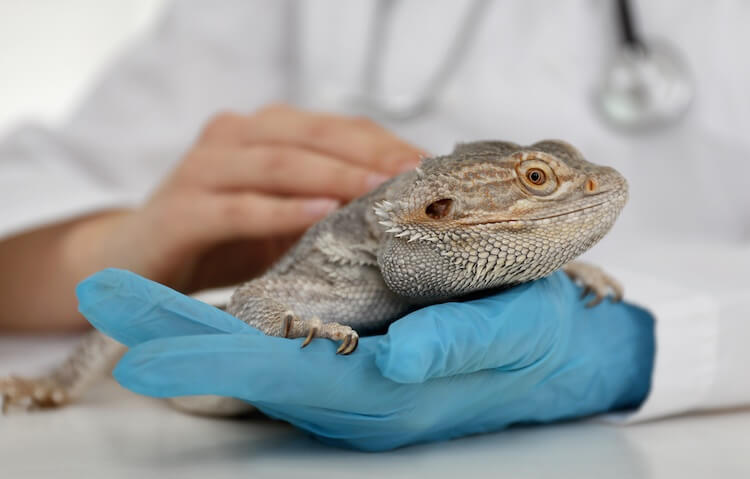
Impaction happens when food, or any item, gets stuck in your beardie’s intestinal tract and causes a blockage. This blockage is highly uncomfortable and leads to a bearded dragon not eating.
The most notable symptoms of impaction are a lack of appetite and a change in feces. Their poop may completely stop or be very small and grainy.
Unlike brumation, where his appetite slowly decreases, impaction occurs as a sudden lack of eating.
Impaction is quite common in reptiles that live in enclosures with the wrong substrate (e.g. sand and gravel). Loose substrate is easily ingested by bearded dragons and is the main reason behind impaction. Using a substrate like reptile carpet, newspaper, or tiles greatly reduces the risk of impaction, especially in hatchlings and juveniles.
Sand impaction is easy to see with x-rays and can be felt by gently touching their stomach.
If you think your bearded dragon is impacted, then stop feeding and take him to a vet as soon as possible. Sometimes impaction can clear up on its own, but it normally requires a trip to the vet.
6. Parasites
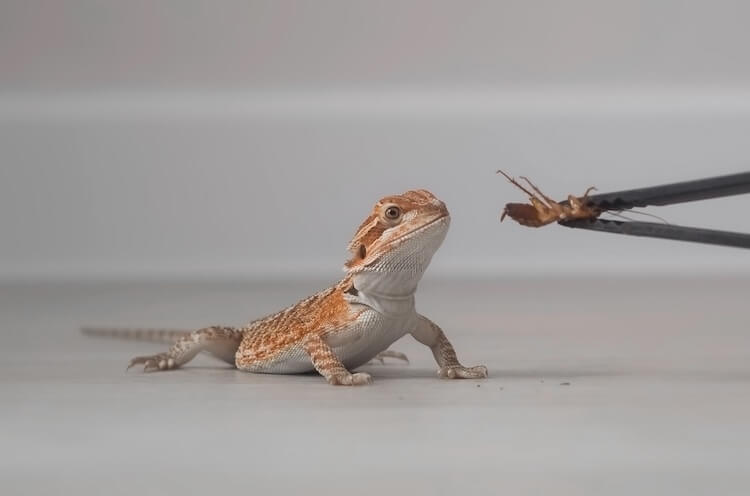
Internal parasites are normally a bigger problem for wild-caught pets. Captive-bred species can get parasites from their prey, or through contact with other reptiles, but this is not as common.
Every bearded dragon is able to carry a certain parasite load without it impacting their health. But, too high of a load can lead to problems that include a lack of appetite and weight loss.
Protozoans, nematodes, and trematodes are some of the most widespread parasites. Wild insects are often carriers of these parasites so you should never feed wild insects.
Also if you are handling more than one reptile, then wash your hands between cages to prevent the spread of parasites.
Infected dragons are lethargic, thin and do not want to eat. They will still poop, but it will be runny and discolored. This is the biggest sign of a parasitic infection.
Parasites can be tested for by a vet and are usually easy to treat with antiparasitic medication.
Sometimes bearded dragons adopted from poor living conditions may already have parasites. It is important to take any adopted dragon to a vet for a thorough exam to rule out any future problems with parasites.
7. Stress
Not eating is the number one sign of stress in bearded dragons. Refusing food, lower activity levels, increased aggression, black beards, pacing and glass surfing are all signs of stress.
There are many causes of chronic stress:
- Wrong tank temperature or humidity.
- Small enclosure (less than 75-gallons).
- Aggressive tank mates.
- Bad diet.
- Improper handling.
- Illness.
Out of all reasons on this list for why a bearded dragon is not eating, stress is the most difficult to understand. If your pet appears stressed, then begin going through the possible reasons above, starting with temperature and moving down the list.
It is normal for bearded dragons to be stressed when first brought home. This stress is not chronic and should reduce quickly within the first week.
8. Wrong Diet
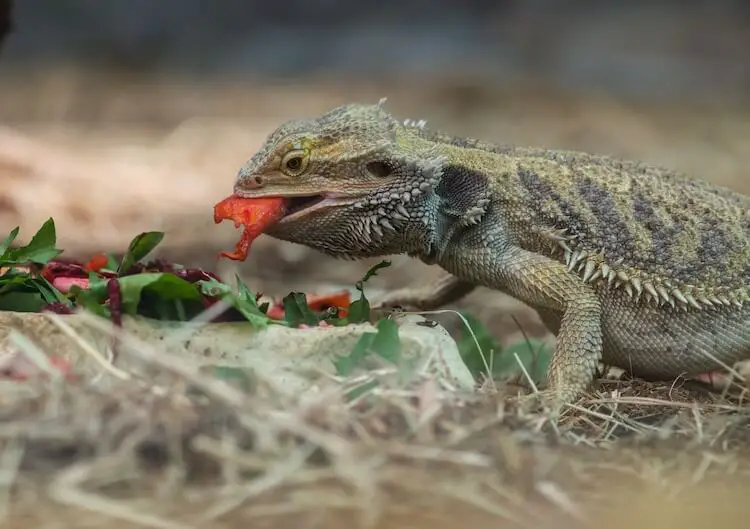
A common reason for a bearded dragon not to eat is feeding the wrong foods.
Beardies are omnivorous insectivores. This means they eat mostly plants, but get most of their protein from insects. Foods like meat, fish, dairy, dead insects, onions, and peppers should not be fed.
Adults need a diet of 75% plants and 25% insects. Feeding too many insects can result in constipation and impaction.
Juveniles need more insects than veggies, but they should not be fed insects high in chitin (e.g. mealworms). These insects have hard shells can also cause intestinal blockages.
Finally, not all bearded dragons like the same food.
Some love crickets and others may only want dubia roaches.
Try offering a variety of fruits, veggies, and insects to find out which foods your bearded dragon likes.
Food variety is also a great way to make sure they get a healthy balance of vitamins, minerals and nutrients.
9. Vitamin Deficiency
There are several vitamins that bearded dragons need to stay healthy. Vitamin E, A, and B1 are all very important to their diet.
A Vitamin E deficiency can cause a lack of appetite, but it is very rare.
Vitamin D is the vitamin that many bearded dragons lack. Calcium supplements are often mixed with vitamin D3, so dusting food with a calcium supplement will prevent any deficiency.
Feeding a balanced diet that has lots of leafy vegetables will prevent most, if not all, vitamin deficiencies.
Bearded dragons that are recovering from a hunger strike are more likely to have a deficiency.
If you think your lizard might have a vitamin deficiency then take him to a vet to check his blood vitamin levels. Trying to self-dose your beardie with vitamins can result in an overdose.
10. Injury
An injured bearded dragon is likely to stop eating, especially if the injury is bad. Severe or infected injuries should always be treated by a vet.
There are many potential causes of injury, although most of them are easily prevented:
- Sharp and abrasive edges on tank décor can cause injuries, especially on their soft stomachs and toes. Make sure all décor is suitable for reptiles and does not have any sharp edges or corners.
- Beardies should be housed alone. Males can be highly territorial when kept in the same enclosure; they are likely to fight and cause injuries to each other.
- Allowing live insects to roam your bearded dragon’s enclosure can cause an injury. Large crickets have been known to chew on lizards’ feet and tails. These wounds can then become infected.
Minor injuries can be cleaned at home with warm water and an antibiotic. Usually, a small cut will not stop your bearded dragon from eating unless it is infected.
Summary
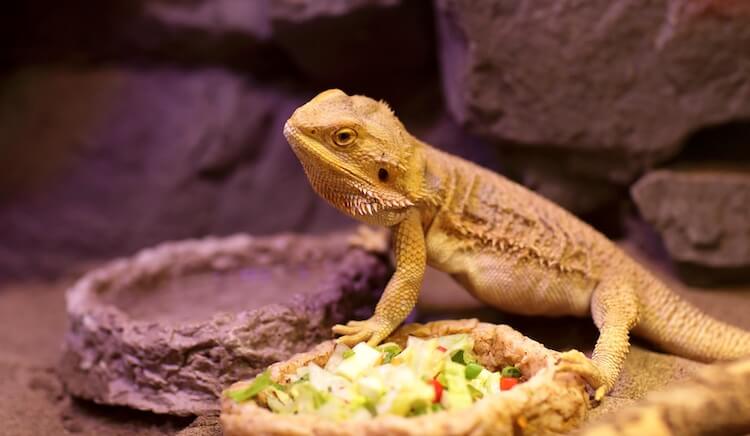
If your bearded dragon does stop eating, and he is not shedding or brumating, there are a few steps you can take to get him eating again.
Start by checking the UVB bulb is less than six months old and ambient and surface temperatures are within the correct range. Bearded dragons can also stop eating if they are in a tank that does not have enough hiding spots or is too small.
If their tank is setup correctly, one of the best ways to get bearded dragons to eat is to feed them treats. Fatty insects like waxworms, hornworms and silkworms are often a good choice. Fruits such as raspberries, strawberries, cantaloupe and mango also work well.
Bearded dragons that are refusing to eat because of an infection, impaction or injury will not start eating again until the underlying issue is fixed. They will need to be taken to a vet.
Has your dragon ever given you a scare by not eating? Let us know in the comments.

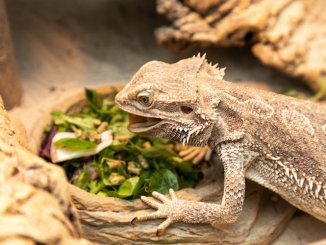
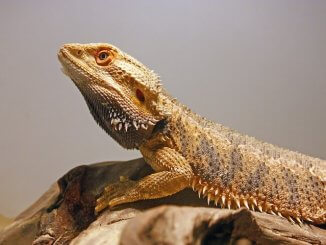
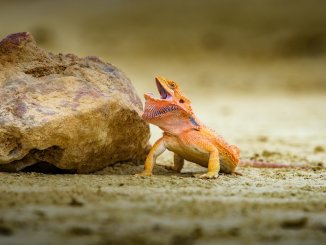

Thank you for the information ! I found it useful and easy to read .
Rex Manning will not eat a single vegetable , and I have tried them all . When I say I have tried them all , I mean, Rex and I have both tried every leafy vegetable , squash , berry , weed (not marijuana for him) and fruit under the sun . I have lost a lot of weight since adopting Rex .
I have tried putting worms in with the veggies so when he misses he eats the veg , he now refuses to eat unless I feed him with tongs. I then tried slipping a veg in after a few hand fed worms . Rex closes his eyes, turns his head and refuses to eat , sometimes for days . He also acts as if I have tried to poison him .
His owners before had him only eating iceberg lettuce (and meal worms) but I am unable to get him to eat that now.
Please help !
He also rips down any plant I put on the bottom ‘quarter’ of the glass, but seems less stressed by his reflection. But still distracted.
I have spoken to vetS, breeders, and pet stores and taken all advice I could and ran ! Nothing seems to be working and it’s been just over a year and a half.
I love my grumpy old man Rex Manning , he has movement in his back legs again and I got rid of the mites as soon as I got him . He snuggles and smiles and has a quirky personality . But I need him to start eating some sort of vegetable .
I feed him super worms mostly with the occasional butter or horn worn, and gut load them as best I can.
Thank you for taking the time to read my babble .
Rex Manning is approx. 9or10 as the previous owners believed him to be 7or8.
I have a juvenile dragon named Beasley. He is about 5 to 6 months old. He is active alert but I’ve tried everything from tongs to hand feeding as well as roaches
He is not fan of crickets. I’ve tried fruit also. I’m worried that because I don’t give him is calcium dusted on roaches or worms! Please help!
My 8 month old beardie Earl has lost interest in insects. We used to go through 250-300 crickets a day and now I’m lucky to get him to eat 10 a week. He will only eat super worms if I hand feed him. He is still eating a big salad everyday. He seems okay, running around outside his enclosure, pooping regularly. I cannot figure out what is going on with him.
Like all younglings, young bearded dragons are voracious. But if 300 crickets is not an exaggeration you have given him a lot!
Either way, loss of appetite and a change in food preferences are completely normal as they grow, and you mentioned a daily salad so it’s not like Earl is starving. If he otherwise behaves normally, I wouldn’t worry about it.
I have a female beardie she is a rescue dragon
She won’t eat anything but a few warms I’m worried
Have you tried feeding her a diverse diet? A lot of vegetables such as dandelions, leafy greens and zucchini are beloved beardie food items. Add Calcium and Vitamin D3 supplements, and try different feeding techniques for live prey: still prey, pincers, freely roaming prey etc…
My beardie recently lost an adjacent tank beardie. He died of old age…18 years. She is 12 and has stopped eating. Its been a week and she is refusing her faves. Is she stressed from the loss of an old neighbor?
This may very well be the case! Bearded dragons are affectionate animals and have been shown to recognize their owners as well as other dragons. As is the case for humans, only time can heal certain wounds. Do not force food, and try to monitor its intake. It is unlikely that the dragon will starve itself, but stress can definitely reduce appetite. Our suggestion is not to get a new companion right away, especially in the same enclosure, as this will likely increase stress levels.
I recently got a bearded dragon he is very small I’m not sure of the age and he is not wanting to eat and just looks so sick the past few days I’m not sure what to do to get him to eat something .
This could be caused by a number of reasons. It is crucial to give your dragon the correct temperature and temperature gradient, UV, lighting and humidity conditions, or some type of problem is likely to arise. Give your dragon a diet suited to his young age. Follow our Bearded Dragon Care Sheet for a detailed look at all of these pieces of information.
If you are certain to have put him in the correct conditions, you might need a veterinary’s opinion, since you might be looking at either impaction problems, or parasite infections.
Having said this, it might also just be about him getting used to his new space.
It’s been like 6 months from the last time my bearded dragon ate. No matter what I try he just won’t eat. We moved and every since then he quit. Please someone help
I have observed many many times that moving or altering the enclosure can coincide with some degree of appetite loss. Ultimately, an animal will feed only when relatively comfortable in his environment, and it takes time to adjust to changes in their surroundings.
Certainly 6 months is a long time, and if he looks healthy otherwise, he has probably been brumating for most of this time. Otherwise, you might want to consider whether his new home is at all appropriate. Has something in or around his enclosure changed significantly? Light or noise sources, threatening shapes in the room he’s in, temperature and humidity are things to consider. In terms of actually getting him to eat, consider switching up between different food sources and feeding techniques, and always make sure your movements are unthreatening.
My bearded Elliot is about 7/8 months. We recently changed his tank from 40 to 75 gallons and since we changed it he has stopped eating bugs. He used to eat about 8 super worms twice a day, however in the week since we changed his tank he has eaten maybe 8 total worms. He still eats his greens pretty well but I’m a little nervous about his cessation of bug eating. We also covered his glass with paper because he’s a freak about his reflection and he still surfs all the time. Not sure what’s going on with him but would love to know so I can give him his best life. Thanks
I wouldn’t worry… for two main reasons:
The first is age. As they approach maturity, bearded dragons need and want less and less insects (although they remain an important food source) and less frequent meals.
The second is that you have recently moved him and he might be getting adjusted to his new environment that, in any case, has not caused him to stop eating completely (which would have been an issue).
Just make sure he is getting enough Calcium, by providing supplements in his food and perhaps placing a sepia bone in his enclosure.
I’ve had my bearded dragon, Cornelius, for about 18 months now. We moved to a different house 9 days ago. His tank is the same except for I took the background off the tank because at the new house he has a view out the windows but isn’t in direct sunlight. Since the move he won’t eat his roaches at all. He’s had maybe 2-3 bites of his greens and about 3 blueberries. He’s pooped twice this week. I know that stress can cause a loss of appetite but I’m getting really worried since it’s been 9 days now. Any ideas or suggestions?
You said it. This is probably the stress of moving around. Perhaps try inserting back the background because the window may turn out to be a source of stress with all the moving things passing outside that may feel threatening to him. Keep in mind that he is becoming a young adult, and it is perfectly normal to expect a less frequent feeding schedule, and considering he has not gone on a full-on hunger strike, he should not be in trouble.
The windows he can see out of actually is the back yard without a lot of traffic except when the dogs go outside. He seems to have adapted to that. He’s now eating his roaches daily but will not touch his greens. But he’s went on a green strike before lol. He’s getting extra roaches because he did lose some weight and I want to get him back up to a good weight. When we got him he was underweight and it took some time to get him where he should be. Thank you for your assistance on this. Your site has a lot of good information and is easy to follow.
Glad we could help!
And remember that dragons can be picky eaters, so try to offer him different green items like dandelions leaves, prickly pear or collard greens. These also have a high calcium content, so you’ll know whether his green strike is related to a calcium need.
A few months ago I got two bearded dragons named Rhianna and Draco from some family friends. They were pretty healthy when they got here and were all good until a few weeks ago when Rhianna started to be super lethargic and stopped eating as much. Since then she has gotten super skinny, is super lethargic, will only eat a little bit sometimes and hardly moves. I’m not sure how to help her.
Well, if I understood correctly you have two bearded dragons, have had them for a few months, and only one of them seems sick.
I would rule out an incorrect diet or enclosure setup because these factors would most likely affect both dragons. I’m leaning toward an impaction problem (what substrate do you use?) or an infection of some sort. A much more reassuring explanation is that she went into brumation (if this behavior has coincided with the coming of winter), when is perfectly expectable for her to eat less and stay still, but she shouldn’t look too deprived as you said. Probably a veterinarian is your best option at this time.
I want to add that I have read reports of people keeping dragons together in a sub-optimal enclosure and them having to compete for ‘sunlight’ and warmth, so you might look into this too. Draco might be bullying her out of their small optimal temperature spot.
I have a 2-3 month old bearded dragon that I got from petco about a month ago. I set his tank up and noticed I had small mite looking things in the sand and didn’t want anything to happen to him, so I took him out and put him in a plastic tub with small granule sand and set up his basking light. I took everything out and wiped it down with a water/soap then rinsed it with water, then went back and disinfected it with a light bleach and water mixture. Ever since then he’s refused to eat, he stopped eating his mealworms and has probably eaten a vegetable on is own 2-3 times since I got him. I thought he stopped eating from stress, than became concerned it was impaction. His had diarrhea the day I fixed his tank which i assume was from stress. And now he’s been going a greenish poop and still hasn’t eaten. I fixed the tank 3 days ago, he had started to shed 2 days before that but I’m just not sure why he stopped eating.
Thank you for your time and sorry for the lengthy question
Hi Isaac. Interesting question there. The last thing you said seemed to me very relevant: shedding.
Shedding is a stressful time for your Dragon, and he had been in the process for days already, then the cleaning happened, he was moved and he potentially went through quite a stressful time as you suggested.
To help your dragon shed during this time, make sure to read our guide to understand the process a bit better, but also make sure that he has a hiding spot with a medium-rough surface that he can rub against (so nothing too sharp) to help the mechanical process. Other rough spots in the enclosure like branches, can help as well. Make sure humidity is in the upper end of the spectrum (so closer to 40%), as this reduces injury and eases the shedding process. If you think he might have a stuck shed, you can even bathe him or mist him to soften that part of the body.
I also want to add that bleach can be used but it needs to be at the right concentration of around 50ml per liter of water.
Overall I think that’s all you need to worry about, as it is perfectly expectable for him to eat less during this time. If you have doubts about impaction though, do consult a vet.
I have a 7 year old female beardie. We moved back in March and she has had a change of scenery. I’ve noticed since the move she has barely eaten and the last month she hasn’t eaten at all and stays in her tunnel 100% of the time without moving unless I take her out to try and feed her / outside for bathroom. She will not poop in tank. She has also never been one to drink water but with not eating greens or super worms I am worried something is wrong. Maybe this is a burrowing? Not sure since we are getting into summer and I keep her tank temp regulated with heat and light on time schedules. Any thoughts are helpful!
Hi James. In terms of what’s causing this, it is hard to tell but I would point to the change of scenery which initially caused a stress, and maybe later caused other problems down the road. Has anything changed inside her enclosure? Substrate or lighting in particular? Or how long and stressful was the moving process? What about the things she sees from her new enclosure? Are there lights or movements that might scare her? Ask yourselves these questions. One little thing can snowball into something much bigger. One example, a moving process caused her to be stressed and hidden, she went into a little calcium deficiency, she ingested substrate as an instinct to intake calcium, she is now suffering from impaction. Another example, she was cold during the moving process, so her body automatically went into brumation, and she is now in that process despite the approaching summer.
In terms of solving this try different food items, use a calcium supplement (or provide a sepia bone inside the tank), do not confuse feeding with other encounters (e.g. handling, cleaning the tank etc..), get a thermohygrometer (if you don’t have one already), and substitute your UV bulb with a new one. Hope this helps!
I have a three year old beardie who has not willingly eaten in months. I’ve taken her to 2 vets and so far no progress. Veggies, bugs, fruits, Antibiotics, dewormer, medicated food. Nothing. I have to syringe feed just to get anything into her. Over 6 months ago I moved her cage from the high traffic living room to a quieter spot in the dining room. Could this be affecting her appetite? Do you think moving her back would help? She seemed fine for a while but maybe I just didn’t notice. She’s very skinny now. 🙁 I’m doing my best and I only want her to get better.
This is indeed a very long time. If you suspect that the hunger strike sort of coincided with moving out the living room, moving her back might certainly help. Perhaps there is some other feature in the new room that is making her uncomfortable, although after all this time some degree of adaptation to a little disturbance is expected. Did anything else change? Lighting, substrate , room temperature etc.. In these cases I would usually suggest to visit the vet but it seems like you did this already. I would rule out impaction, brumation or disease because this has been going on for too long. It seems stress-related!